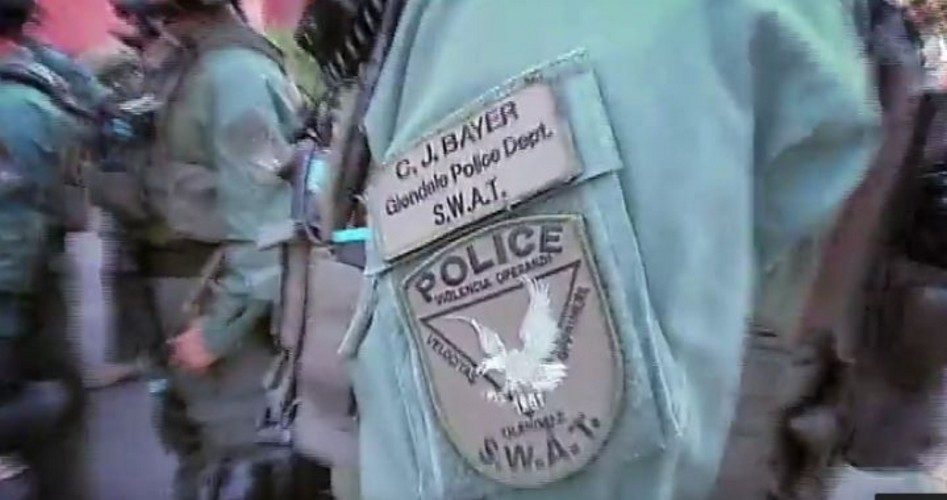
The powerful law-enforcement lobby has effectively killed a bill in Arizona that would have prohibited the use of state and local resources in carrying out federal restrictions on the right to keep and bear arms. Had the measure become law, Arizona would have placed the rights of its citizens beyond the unconstitutional attempt of the Obama administration to confiscate weapons from civilians.
But, that will never be.
The bill intended to forbid any state or local agency and their employees from knowingly and willingly participating in any way in the carrying out of any federal act, law, order, rule, or regulation promulgated for the purpose of restricting the right to own a personal firearm, a firearm accessory, or ammunition.
Any such order or act would have been declared unconstitutional in that it “infringes the right to keep and bear arms guaranteed by the Second Amendment of the United States Constitution or that impairs that right in violation of Article 2, Section 26 of the Arizona constitution.”
The Arizona Constitution reads in relevant part, “The right of the individual citizen to bear arms in defense of himself or the State shall not be impaired, but nothing in this section shall be construed as authorizing individuals or corporations to organize, maintain, or employ an armed body of men.”
The use of state assets or money in the enforcement of any future federal gun restrictions was expressly banned by the bill.
In February, the state House of Representatives passed the bill, sending it on to the state senate where the powerful police lobby began pressuring lawmakers to scuttle the measure.
Why, readers may wonder, would law-enforcement lobbyists want to overturn a bill that would protect the people they represent from participating in the execution of unconstitutional federal firearm regulations?
The Tenth Amendment Center offers a plausible explanation of the conflict: “The entirety of the argument against HB2300 presented by John Thomas of the Arizona Association of Chiefs of Police during a committee hearing was based on the position that it would target, as violators of the proposed law, individual law enforcement officers who inadvertently (not intentionally) help the federal government violate the Second Amendment while participating in joint operations on other, unrelated issues.”
According to the publicly available record of testimony offered by Thomas during a state senate hearing, he enunciated the police’s position. “This means if there is an impairment of your Second Amendment rights by the federal government working — and you’re working with them as a local state agency, even if you weren’t aware that they were going to do this, even if you weren’t aware that it is an impairment, you’re still in violation of this law,” Thomas testified.
Then, Thomas seemed to suggest that local law enforcement prefers serving and protecting the federal government rather than the people of Arizona. “Telling us we can’t work with the feds for fear that one of our people might inadvertently work with an agency that violates the Second Amendment stops us from cooperating with the federal government,” Thomas said.
In another comment, Thomas claimed that by killing the proposed nullifying legislation, he was merely protecting those police officers who would unwittingly cooperate with federal agencies in carrying out gun control regulations. “Postal service says they’re going to do a child porn bust; they call the local jurisdiction, law enforcement comes and secures the scene, outside to make sure everything is OK. They go in. They bust three people. They take weapons away from all three people. Two of them, they should have taken it away, the third, maybe not — maybe it would be a violation of the 2nd Amendment for taking it away. Our officers there are now in violation of this law even if they did not know they were going to do that.”
Unfortunately, Thomas’ dire prediction is patently false and is explicitly obviated by the blackletter of the proposed bill. The bill requires that any state and local officer charged with violating the bill must have done so “knowingly and willingly,” thus removing from liability anyone inadvertently cooperating with the federal government’s efforts to violate the people’s right to keep and bear arms.
According to sources familiar with the conversations between law enforcement lobbyists and lawmakers, the police representatives were unsure what it means to “infringe on the right to keep and bear arms.”
In fact, the lobbyists were so anxious to kill the bill that they resorted to scare tactics, persuading state senators that the measure was ambiguous and would have held accountable police who simply disarm a suspected pedophile during an arrest, a scenario that the Tenth Amendment Center described as “clearly a ridiculous interpretation.”
In light of that legerdemain, it’s little wonder that lawmakers demurred when it was time to cast a vote on the federal gun control nullification bill.
Regardless of the ridiculousness, the bill’s sponsors offered to substitute language the lobbyists would consider less “vague,” but that overture went unheeded, leaving supporters believing that the “inadvertent” violation argument was smoke and mirrors hiding the fact that the police — many of whom receive millions in materiel from the federal government — do not want anything interfering with their ability to carry out the commands of those to whom they are so heavily indebted.
The Tenth Amendment Center reports that state Representative Anthony Kern, the bill’s primary sponsor, has committed to working over the summer to making changes to the text of the measure that would make it less susceptible to attacks by law enforcement and their lobbyists.

